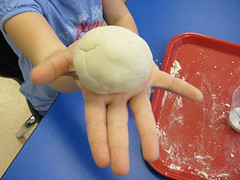Imagine if you went to the hospital and the doctors and nurses seemed more interested in texting or tweeting than caring for you. How would that make you feel about yourself and about them? Would you think that you were getting the treatment you deserved? Would you feel like paying the bill after your stay?
How Would You Act?
Being a childcare provider is a very important job because you are helping to shape our next generation. What message are you sending to your host kids when you would rather interact with phone than with them? How will they feel about themselves and about you? Children feel as though everything is about them. They will see this as a rejection of them and they will be more likely to act out.
Safety Comes First
Not paying enough attention to your host kids poses safety concerns too. Accidents happen, but when an adult caregiver is close by and appropriately supervising children, the chances of a major injury are dramatically reduced.
Technology Best Practices
When you are working, you should not do any of the following:
- Text/Talk to friends/family on the phone
- Chat/Instant Message with friends/family online
- Use Skype or FaceTime
- Email
- Tweet
- Update your status on Facebook or any other social media
- Use Snapchat, WhatsApp or any other app or social media site
- Watch YouTube videos
- Upload photos on Instagram
- Play video games
- Use the phone or other device while driving (Never do this- even when you aren’t working!)
Exceptions- the only time it’s okay to use your computer, phone, tablet, etc. while you are working is when your host parents have given your specific permission to do the following:
- Text/Call your host parents
- Help your host children find a pre-approved website (like Nickjr.com)
- A job-related task that your host family has asked you to complete
When in doubt- ask your host parents!
Finally, do not text, scroll through Facebook, answer your phone, etc. when eating meals with your host family or while talking with your host parents. Even if you think you’re a great multitasker, your host family will think you are being rude.
Going unplugged during work may seem impossible, but think about this — even if you work 45 hours a week, you still have 123 hours left in the week for all of that other stuff, or about 70 hours (if you are getting the recommended 7-8 hours of sleep per night).
A Note to Host Parents
Please be clear about what you consider acceptable technology use during work hours to avoid misunderstandings. Your au pair is most likely very accustomed to being plugged in at all times. She doesn’t intend to be rude, but she might not realize how her actions will be perceived. Please use this information as an opportunity to begin a dialogue on the issue.
(Adapted from Christine Connally’s blog post, Going Unplugged During Work Hours)





